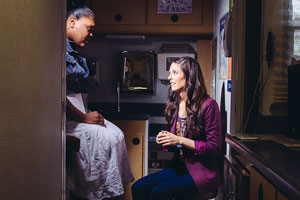
These Mobile Clinics Bring Health Care to Children and Teens in Detroit
When Dr. Elliott Attisha, a Henry Ford pediatrician, asked one of his young patients to breathe deeply, he was shocked at what he heard through his stethoscope: nothing. “This child had suffered with untreated asthma for so long,” he says, “she no longer knew what it was like to take a deep breath.”

When you work with the city’s most vulnerable patients, says Attisha, “you realize what you take for granted.” In Detroit, the lack of reliable transportation is a serious roadblock for many families.
In 2011, Henry Ford launched a mobile clinic program that would serve as a complement to the school-based health centers. Led by Dr. Attisha and his team, the mobile clinics have brought health care to young people at additional schools and community centers. It started with “Hank,” a specially outfitted 38-foot RV named in honor of Henry Ford. “Clara,” another RV named for Ford’s wife, is slightly bigger. She hit the road in 2013.
Each mobile clinic is staffed by a driver, a medical assistant and a nurse practitioner or pediatrician. It also offers an office, nursing station, bathroom, full lab, two exam rooms and a waiting area with a TV.
Up to 85 percent of the mobile clinic’s patients have insurance – usually Medicaid – and an assigned primary care physician, Attisha says. Yet, they don’t see a doctor regularly because they can’t get there.
Changes Coming
Today, the program sees roughly 700 to 800 patients, with about 1,600 visits per year. The mobile team diagnoses and treats illnesses, diseases and injuries. It also helps patients manage chronic diseases and provides wellness care such as physicals, immunizations and vision and hearing tests, among other services. Siblings and neighborhood children are welcome and patients pay nothing.
Prescription drugs are delivered directly to patients’ homes. After treating the young woman with the silent lungs, the team forged a partnership with Henry Ford Pharmacy, which has delivered more than 5,000 prescriptions to patients. “We can show them right on the spot how to use their medicine properly and we can make sure they get it,” Attisha says. And starting next fall, one of the mobile units will become a “Breathmobile,” focusing exclusively on asthma.
An estimated 30,000 to 40,000 young people in Detroit suffer from asthma and 60 to 70 percent are walking around with the disease unmanaged, according to Attisha. “So it’s no wonder Detroit’s kids are three times more likely to die from asthma than those living just 30 minutes away in the suburbs,” he says.
Asthma is also the number one health reason Detroit students miss school, Attisha says. That doesn’t include the kids who spend all night coughing and drag themselves to class but are too exhausted to learn or those who are misdiagnosed with attention or behavior disorders, he added. The clinics help students show up healthy and ready to learn, he says, which will help them live up to their true potential and, hopefully, break the cycle of poverty.
“The Most Marginalized”
The mobile units offer important flexibility, says Dr. Maureen Connolly, a pediatrician at Henry Ford and a member of the mobile team. Last May, Clara began weekly visits to the Ruth Ellis Center, a social services agency helping homeless, runaway and at-risk young people who identify as lesbian, gay, bi-attractional, transgender or questioning.
“I see a lot of transgender women of color,” people who were assigned male at birth but who identify as women, Connolly says. “There are so many forces that work against them in this world.”
Although many health issues arise during the teen years, that’s exactly when even traditional patients tend to drop out of the system, Connolly says. At-risk teens face even more challenges, she says, including prejudice at some pediatric offices focused on newborns and young children. Moreover, about 40 percent of Connolly’s patients at the Ruth Ellis Center are living with HIV. Some live on the streets and make risky choices just to survive, she says.
“They’ve shown incredible enthusiasm for coming to the doctor and following up and taking care of themselves,” she says. “It really is zero-barrier care. This is what health care should be.”
By the time you’re reading this, Ruth Ellis expects to be operating an on-site clinic, and Clara will be rolling into another neighborhood. Such flexibility has worked in reverse, too, when schools with clinics closed. “That’s the nice thing about being on wheels,” Attisha says. “You can get up and follow the people.”
Categories: Get Involved
Tags: Blog
